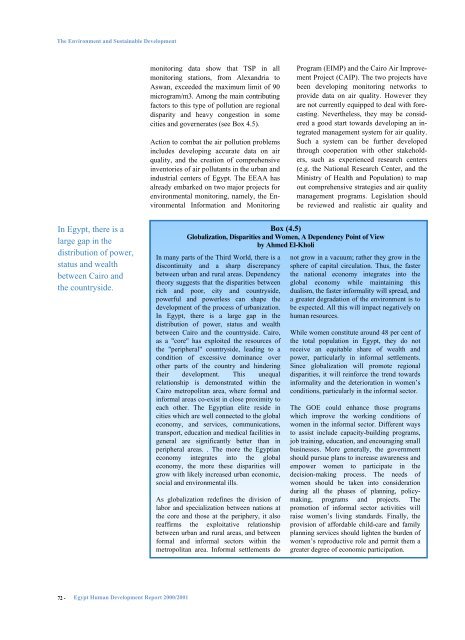English - Human Development Reports - United Nations ...
English - Human Development Reports - United Nations ...
English - Human Development Reports - United Nations ...
You also want an ePaper? Increase the reach of your titles
YUMPU automatically turns print PDFs into web optimized ePapers that Google loves.
The Environment and Sustainable <strong>Development</strong>monitoring data show that TSP in allmonitoring stations, from Alexandria toAswan, exceeded the maximum limit of 90microgram/m3. Among the main contributingfactors to this type of pollution are regionaldisparity and heavy congestion in somecities and governerates (see Box 4.5).Action to combat the air pollution problemsincludes developing accurate data on airquality, and the creation of comprehensiveinventories of air pollutants in the urban andindustrial centers of Egypt. The EEAA hasalready embarked on two major projects forenvironmental monitoring, namely, the EnvironmentalInformation and MonitoringProgram (EIMP) and the Cairo Air ImprovementProject (CAIP). The two projects havebeen developing monitoring networks toprovide data on air quality. However theyare not currently equipped to deal with forecasting.Nevertheless, they may be considereda good start towards developing an integratedmanagement system for air quality.Such a system can be further developedthrough cooperation with other stakeholders,such as experienced research centers(e.g. the National Research Center, and theMinistry of Health and Population) to mapout comprehensive strategies and air qualitymanagement programs. Legislation shouldbe reviewed and realistic air quality andIn Egypt, there is alarge gap in thedistribution of power,status and wealthbetween Cairo andthe countryside.Box (4.5)Globalization, Disparities and Women, A Dependency Point of Viewby Ahmed El-KholiIn many parts of the Third World, there is adiscontinuity and a sharp discrepancybetween urban and rural areas. Dependencytheory suggests that the disparities betweenrich and poor, city and countryside,powerful and powerless can shape thedevelopment of the process of urbanization.In Egypt, there is a large gap in thedistribution of power, status and wealthbetween Cairo and the countryside. Cairo,as a "core" has exploited the resources ofthe "peripheral" countryside, leading to acondition of excessive dominance overother parts of the country and hinderingtheir development. This unequalrelationship is demonstrated within theCairo metropolitan area, where formal andinformal areas co-exist in close proximity toeach other. The Egyptian elite reside incities which are well connected to the globaleconomy, and services, communications,transport, education and medical facilities ingeneral are significantly better than inperipheral areas. . The more the Egyptianeconomy integrates into the globaleconomy, the more these disparities willgrow with likely increased urban economic,social and environmental ills.As globalization redefines the division oflabor and specialization between nations atthe core and those at the periphery, it alsoreaffirms the exploitative relationshipbetween urban and rural areas, and betweenformal and informal sectors within themetropolitan area. Informal settlements donot grow in a vacuum; rather they grow in thesphere of capital circulation. Thus, the fasterthe national economy integrates into theglobal economy while maintaining thisdualism, the faster informality will spread, anda greater degradation of the environment is tobe expected. All this will impact negatively onhuman resources.While women constitute around 48 per cent ofthe total population in Egypt, they do notreceive an equitable share of wealth andpower, particularly in informal settlements.Since globalization will promote regionaldisparities, it will reinforce the trend towardsinformality and the deterioration in women’sconditions, particularly in the informal sector.The GOE could enhance those programswhich improve the working conditions ofwomen in the informal sector. Different waysto assist include capacity-building programs,job training, education, and encouraging smallbusinesses. More generally, the governmentshould pursue plans to increase awareness andempower women to participate in thedecision-making process. The needs ofwomen should be taken into considerationduring all the phases of planning, policymaking,programs and projects. Thepromotion of informal sector activities willraise women’s living standards. Finally, theprovision of affordable child-care and familyplanning services should lighten the burden ofwomen’s reproductive role and permit them agreater degree of economic participation.72 -Egypt <strong>Human</strong> <strong>Development</strong> Report 2000/2001
















